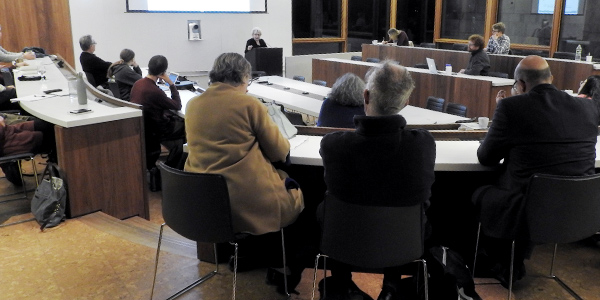By Michael Kuser
BENNINGTON, Vt. — About two-thirds of national constitutions now address environmental rights, but the legal profession has still been slow to recognize the nexus between climate change and human rights, a former New York Public Service Commission official told an audience at Bennington College on Monday.
“There’s very little in law that recognizes this climate crisis as a human rights crisis,” said Eleanor Stein, a former administrative law judge with the New York PSC who now teaches climate change law at Albany Law School and the State University of New York. She also serves on the board of the Rocky Mountain Institute.
Stein earned a master’s in climate change law and policy from the University of Strathclyde in Glasgow, Scotland, the first such program in the world.
Her appearance at Bennington’s Center for the Advancement of Public Action was one in a series of lectures on climate change and environmental justice.
Stein noted that her talk coincided with an event that will spell a serious setback for environmental justice advocates. Earlier the same day, the Trump administration had delivered formal notice that it was pulling the U.S. out of the Paris Agreement on reducing greenhouse gas emissions.
“Today was the first day that the United States, or any other country that was a party to the Paris Agreement, could indicate its intention to withdraw, and that’s because today is three years since the day that the agreement took effect, or ‘entered into force,’ as they say in the world of treaties,” Stein said.
“One year from today, that notification will take effect, and the United States will no longer be a party to the Paris Agreement,” she said. “Ironically, that day, Nov. 4, 2020, is the day after the next presidential election.
“The U.N. Charter and the Universal Declaration of Human Rights of 1948 lack any reference to environmental rights or environmental justice, but suffering environmental injustice prejudices your ability to hold onto other rights,” Stein said.
‘Big, Complicated Mess’
Asked about political developments favorable to the environmental justice movement, Stein referred to New York’s recent enactment of the Climate Leadership and Community Protection Act (A8429), which she called “a big, complicated mess of a law.”
The law requires 70% of the state’s electricity be generated by renewable resources by 2030, nearly quadruples its offshore wind energy goal to 9 GW by 2035 and requires the economy to be carbon-neutral by 2040. It also doubles the distributed solar generation goal to 6 GW by 2025 and targets deploying 3 GW of energy storage by 2030. (See “New Energy Law Could Affect CO2 Market Design,” NYISO Business Issues Committee Briefs: June 20, 2019.)
“In [the law] is something that was fought very hard for by communities of color in New York, and those are provisions that the state has to consider impacts on the most vulnerable communities as it makes its climate policy,” Stein said.
“Every action to slow or stop global warming is significant,” she said. “The Global North created the situation, but the Global South is paying the price in terms of human rights.”






